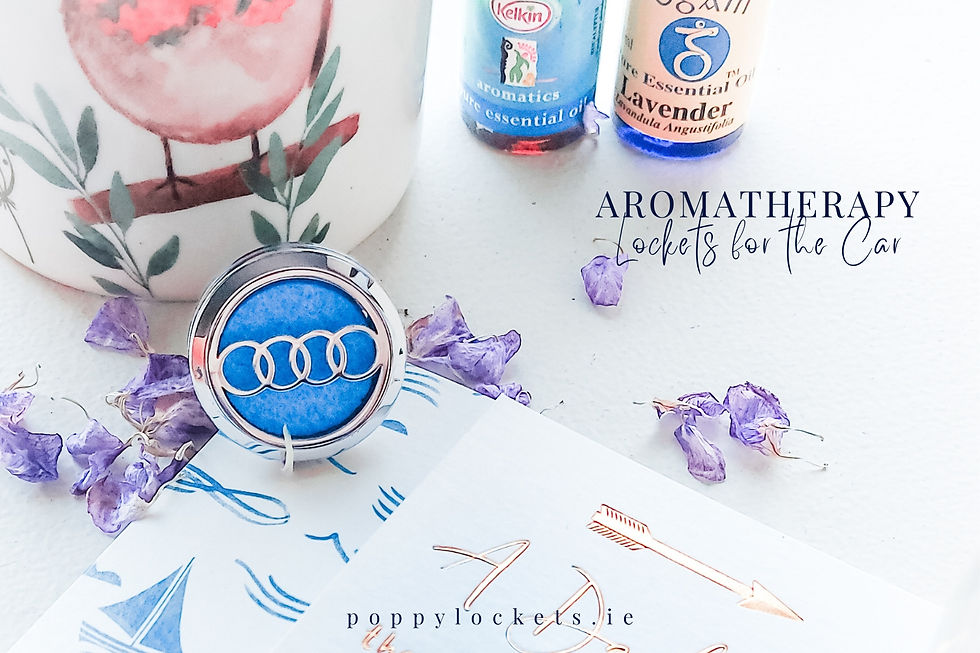Breathwork & Aromatherapy: A Simple Practice for Transforming Your Life
- Helen Brouder
- May 13, 2025
- 6 min read
Updated: May 14, 2025
Breathwork is one of the most accessible and effective tools available for transforming your physical and mental state. In our fast-paced, stressful world, it’s easy to overlook the simple act of breathing - something we do automatically, without much thought. Yet, when used intentionally, the power of breath can create profound shifts in our emotions, stress levels, and overall well-being.
In this blog post, we’ll explore the importance of breathwork, how it can benefit your mental health, and how you can incorporate this simple practice into your daily life.
What is Breathwork?
Breathwork refers to various breathing techniques used to improve physical, mental, and emotional health. It involves consciously controlling the breath in a way that enhances oxygen flow and helps balance the nervous system.
While breathing is an automatic function of the body, breathwork involves deliberately slowing down, deepening, or altering your breath to access its calming and healing effects. These techniques can be as simple as taking deep, slow breaths or as complex as specific patterns used in mindfulness, meditation, or yoga practices.
The Many Benefits of Breathwork
Reduces Stress and Anxiety
One of the most immediate benefits of breathwork is its ability to lower stress and anxiety levels. When we’re stressed, our breath often becomes shallow and rapid. Breathwork reverses this by promoting slow, deep breathing that activates the parasympathetic nervous system, the part of our body responsible for the “rest and digest” response. This helps counter the body’s stress response and encourages a sense of calm.
Promotes Relaxation and Better Sleep
Breathwork can be a powerful tool for improving sleep. Many people struggle with racing thoughts or anxiety at night, making it difficult to wind down. Techniques like deep belly breathing or the 4-7-8 breathing method can help signal to the body that it’s time to relax, slow the heart rate, and prepare for rest. Consistent breathwork before bed can contribute to more restful, restorative sleep.
Increases Focus and Mental Clarity
When we are stressed or anxious, it’s easy to feel foggy or distracted. Breathwork clears the mind by increasing oxygen flow to the brain and promoting a state of mental clarity. This can be especially beneficial during high-pressure situations, meetings, or moments when focus is needed most.
Boosts Emotional Well-Being
Breathing exercises are known to help regulate emotions, especially in moments of overwhelm or distress. Breathwork encourages a mindful, present state, allowing individuals to manage their emotions more effectively. Regular practice can help you develop emotional resilience, reduce impulsivity, and foster a deeper connection to yourself.
Improves Physical Health
In addition to emotional and mental benefits, breathwork also offers physical health benefits. Deep, controlled breathing improves lung capacity, helps detoxify the body by removing excess carbon dioxide, and can even help lower blood pressure. It encourages the body to enter a more balanced, relaxed state, which supports overall health.
Supports Mindfulness and Meditation
Breathwork is often used as a gateway to deeper mindfulness and meditation. By focusing on the breath, you can anchor yourself in the present moment, which is key to cultivating mindfulness. Whether you're practicing a simple breathing exercise or incorporating breathwork into a meditation practice, it can help calm the mind and create space for deeper self-awareness.
How to Practice Breathwork: Simple Techniques to Try
Breathwork is something you can practice anywhere, anytime. Here are a few simple techniques to get started:

1. Deep Belly Breathing (Diaphragmatic Breathing)
Sit or lie down comfortably.
Place one hand on your chest and the other on your belly.
Inhale deeply through your nose, allowing your belly to rise (not your chest)
Exhale slowly through your mouth, letting your belly fall.
Repeat for several minutes, focusing on the rise and fall of your belly with each breath.
This technique helps activate the parasympathetic nervous system, promoting deep relaxation and stress reduction.

2. 4-7-8 Breathing
Inhale through your nose for 4 seconds.
Hold your breath for 7 seconds.
Exhale slowly through your mouth for 8 seconds.
Repeat for 4 cycles.
This breathing method is ideal for calming the nervous system and preparing for sleep. It’s also an effective way to reduce anxiety in stressful situations.

3. Box Breathing
Inhale through your nose for 4 seconds.
Hold your breath for 4 seconds.
Exhale slowly through your mouth for 4 seconds.
Hold your breath again for 4 seconds.
Repeat for 3-5 cycles.
Box breathing is a popular technique used by athletes, soldiers, and meditators to enhance focus and calm the mind.

4. Alternate Nostril Breathing (Nadi Shodhana)
Sit comfortably with your spine straight.
Using your right thumb, close your right nostril.
Inhale deeply through your left nostril.
Close your left nostril with your right ring finger and release your right nostril.
Exhale through your right nostril, then inhale through the right nostril.
Close the right nostril and exhale through the left nostril.
This technique helps to balance the mind, calm the nervous system, and improve focus.
Incorporating Breathwork into Your Daily Life
Breathwork doesn’t have to be a long, complicated practice. In fact, just a few minutes a day can have a profound impact on your well-being. Here are a few ways to incorporate breathwork into your daily life:

Start your day with breathwork:
Set aside 5 minutes in the morning to do some deep breathing. It helps set a positive tone for the rest of the day.
Use breathwork as a reset during the day:
Whenever you feel stressed, anxious, or overwhelmed, pause and take a few deep breaths. It can help shift your mental state and bring clarity.
End your day with breathwork:
Practice breathwork before bed to help unwind and prepare your body for restful sleep.
Breathwork is a simple yet incredibly powerful tool that can positively impact every aspect of your life. From reducing stress and anxiety to improving mental clarity and emotional resilience, it’s a practice that’s accessible to everyone, anywhere. By consciously connecting with your breath, you can calm your mind, heal your body, and cultivate a deeper sense of peace and well-being.
Whether you’re looking for stress relief, emotional healing, or simply a moment of calm, breathwork offers a natural, grounding way to restore balance. So take a deep breath - and embrace the power of your own breath.
Aromatherapy & Breathwork
Breathe in calm, breathe out stress — our aromatherapy lockets are the perfect companion to your breathwork practice. As you engage in deep, mindful breathing, the soothing scents of your favorite essential oils enhance relaxation, grounding your body and mind. Take a moment for yourself with each breath, carrying peace with you wherever you go.
Some Essential Oil Recommendations for Calming & De-stressing
1. Lavender
The go-to for relaxation.
Calms the nervous system, eases anxiety, promotes restful sleep, and softens emotional overwhelm.
2. Bergamot
A citrusy oil with grounding notes.
Uplifts mood while reducing tension — especially effective for emotional balancing and nervous energy.
3. Frankincense
Deep, resinous, and centring.
Encourages deep breathing, mental clarity, and a sense of spiritual calm. Excellent for meditation or grounding.
4. Chamomile (Roman or German)
Gentle and soothing.
Helps ease irritability, restlessness, and emotional tension. Also great for children and sensitive individuals.
5. Ylang Ylang
Floral and exotic with a sweet edge.
Reduces blood pressure, lifts the mood, and helps with nervous tension and self-criticism.
6. Clary Sage
Herbaceous and subtly floral.
Known for balancing hormones and emotional wellbeing. Good for stress that feels tangled with hormonal cycles.
7. Cedarwood
Woody and grounding.
Brings a sense of safety and stability. Supports stillness and calm in moments of anxious overthinking.
8. Sweet Orange
Bright, fresh, and cheerful.
Uplifting while gently relaxing. Helps ease feelings of worry or sadness without sedating.
9. Patchouli
Earthy and grounding.
Calms scattered energy and overthinking. Often used in blends for emotional balance and rest.
10. Vetiver
Deep, smoky, and earthy.
Incredibly grounding for anxiety, panic, or overstimulation. Best used in small amounts or blended.
Tip for Aromatherapy Lockets:
Add a few drops of your chosen essential oil to the felt pad inside your locket. For a personalised effect, try blending a top note (like orange) with a base note (like frankincense or vetiver) for a calming scent that lasts longer.
Here is a beautiful Calming & Grounding essential oil blend, perfect for your Aromatherapy Locket, diffuser, or even a DIY roller - a gentle, emotionally balancing blend to soothe stress and bring you back to centre.

2 drops Lavender – relaxes the nervous system and softens anxiety
1 drop Bergamot – uplifts the mood while calming the heart
1 drop Frankincense – deepens breath and promotes inner stillness
1 drop Cedarwood – grounds scattered energy and creates emotional safety
Optional addition:
Add 1 drop Sweet Orange for a slightly sweeter, more uplifting finish
Or 1 drop Vetiver for deeper grounding (use sparingly – it's strong!)
How to Use:
Add 2–3 drops of the blend total to the felt pad in your aromatherapy locket
Let the scent unfold gently throughout the day
Inhale deeply whenever you need a moment of calm
This blend is designed to support deep breaths, steady emotions, and help you feel more grounded in the now.
.jpg)






Comments